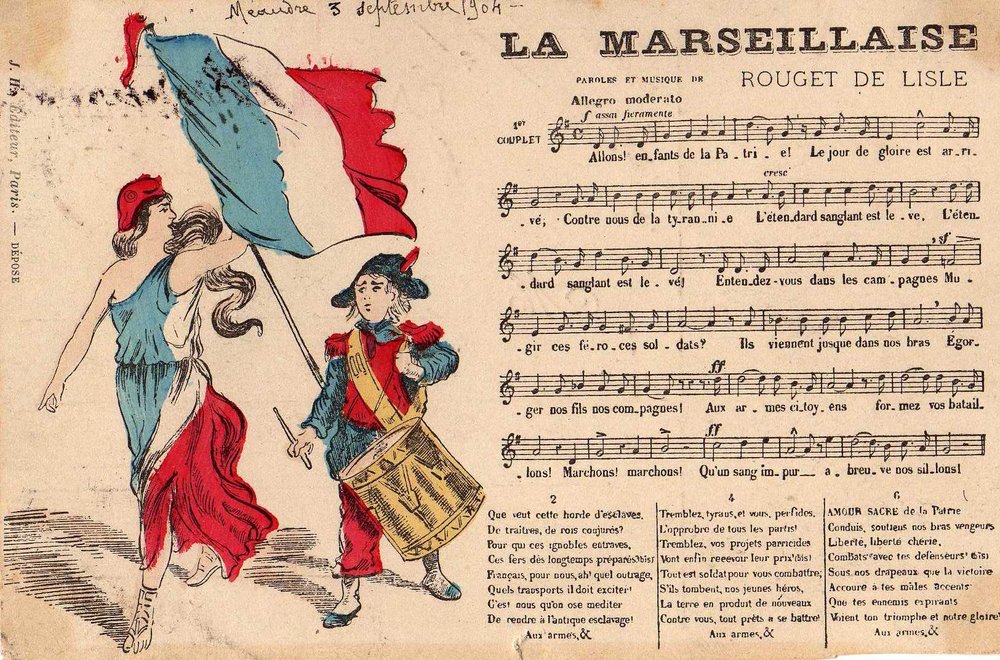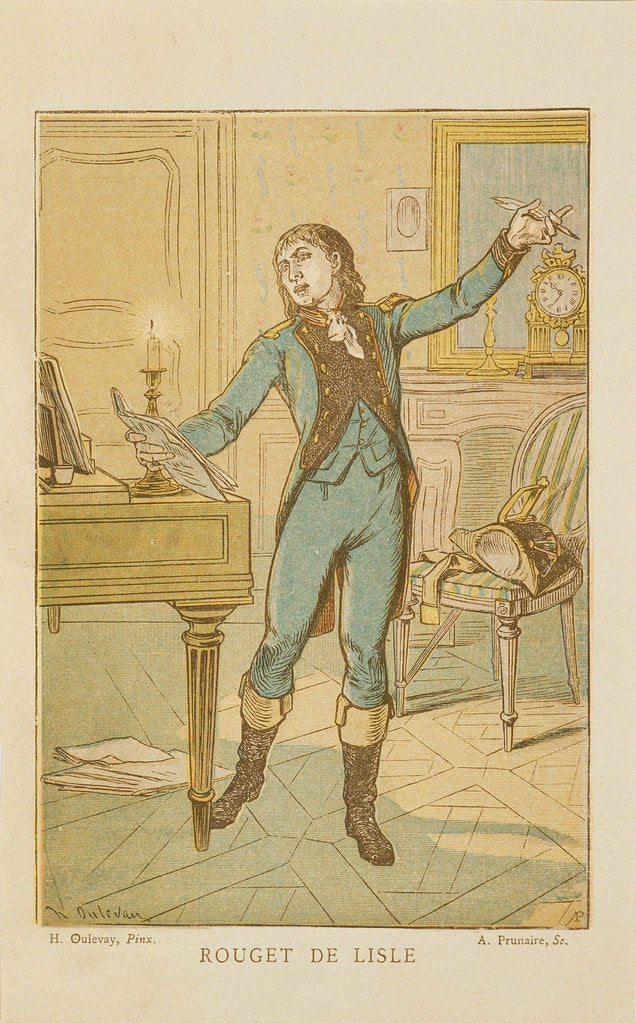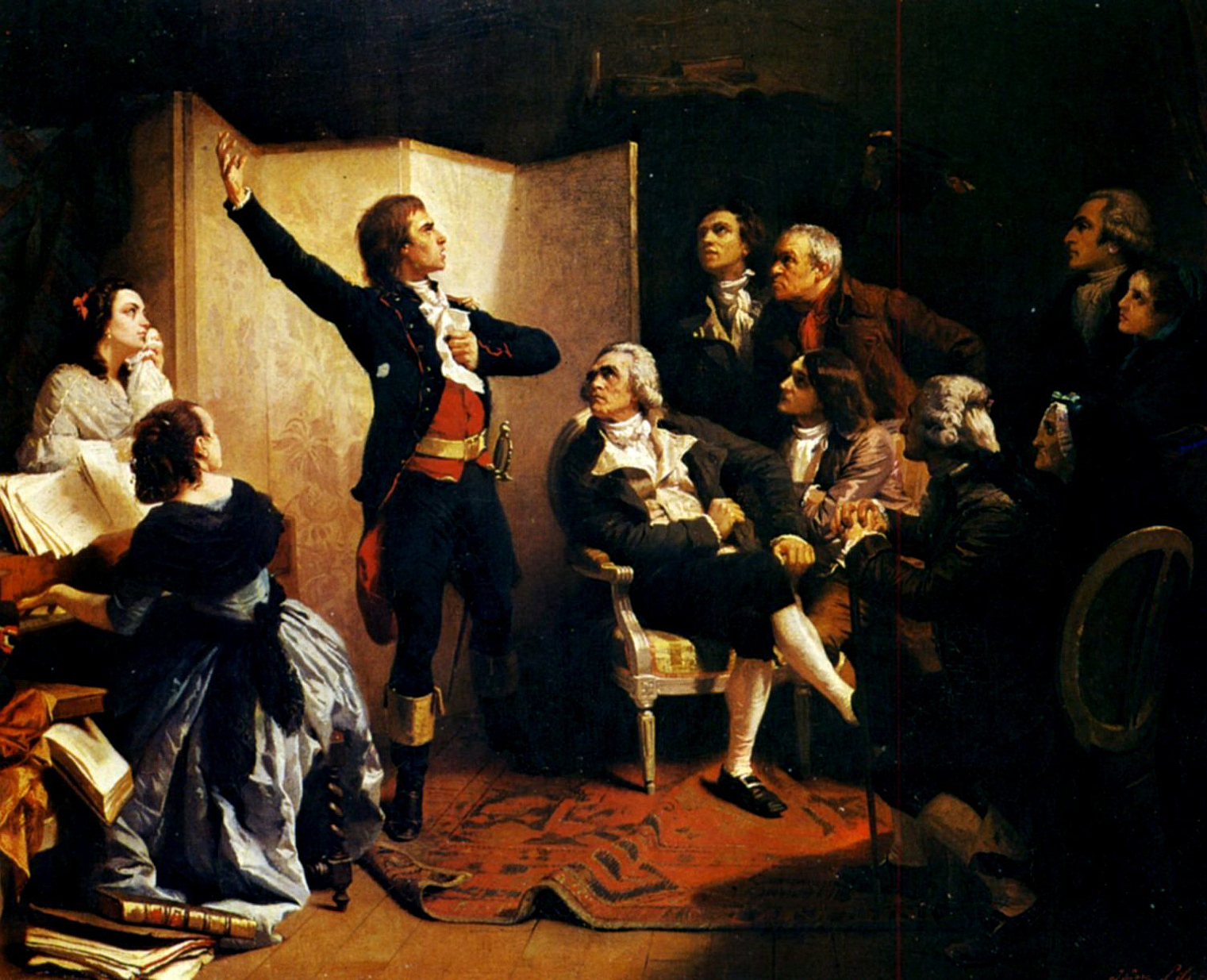|
Showing posts with label MUSIC. Show all posts
Showing posts with label MUSIC. Show all posts
Saturday, July 11, 2020
IN TUNE - by Aufie Zophy
Friday, November 8, 2019
THE MARSEILLAISE - by Claude Joseph Rouget de Lisle

Claude Joseph Rouget de Lisle 1760 – 1836
THE MARSEILLAISE
Ye sons of France, awake to glory,
Hark, hark what myriads bid you rise,
Your children, wives, and grandsires hoary,
Behold their tears and hear their cries!
Shall hateful tyrants, mischief breeding,
With hireling hosts, a ruffian band,
Affright and desolate the land,
While peace and liberty lie bleeding?
To arms! To arms, ye brave!
Th’ avenging sword unsheath!
March on, march on, all hearts resolved
To victory or death.
Now, now the dangerous storm is scowling
Which treacherous kings, confederate, raise;
The dogs of war, let loose, are howling,
And lo! our fields and cities blaze.
And shall we basely view the ruin,
While lawless force, with guilty stride,
Spreads desolation far and wide,
With crimes and blood his hands embruing?
With luxury and pride surrounded,
The vile, insatiate despots dare,
Their thirst of power and gold unbounded,
To mete and vend the light and air;
Like beasts of burden would they load us,
Like gods would bid their slaves adore:
But man is man, and who is more?
Then, shall they longer lash and goad us?
O Liberty! can man resign thee!
Once having felt thy gen’rous flame?
Can dungeon, bolts, and bars confine thee,
Or whips thy noble spirit tame?
Too long the world has wept, bewailing
That falsehood’s dagger tyrants wield;
But freedom is our sword and shield,
And all their arts are unavailing.

This is perhaps the most famous song in the world. Not because it is sung more frequently than any other song, but because it has about it in title, romantic story, and fervor, something that has touched the heart of mankind and inspired for it a respect and admiration in all civilized lands.
Its author, Rouget de Lisle, was a young artillery officer who had a fancy for newspaper writing, and had contributed a number of articles to a newspaper in Strasburg owned by the mayor of the city. He dined one evening at his great friend’s house, and the conversation turned on the departure of several hundred volunteers from the town of Strasburg to the Army of the Rhine. There were to be public ceremonies connected with the departure of the troops, and Mayor Dietrich urged young De Lisle to write a martial song to be sung on that occasion. He consented and went at once from supper to his room. The weather was bitter cold, but he sat down at the piano, and between reciting and playing and singing, eventually composed the Marseillaise, and, thoroughly exhausted, fell asleep with his head on his desk.
In the morning he handed the song complete, with words and music, to his friend, Baron Dietrich. Every one was enchanted with the song, and was roused by it to the greatest enthusiasm. It was sung a few days later at the departure of the troops from Strasburg, and thence to the insurgents of Marseilles, and soon to all the nation. In six months it had been adopted by the people, the army, the legislature, and the whole country. Its appeal to liberty and glory voiced the hunger of the popular heart at the time, and never did song so completely charm and capture an entire people.
De Lisle’s mother was a most ardent royalist, and when the hymn was on everybody’s lips, asked of her son, “What do people mean by associating our name with the revolutionary hymn which those brigands sing?” De Lisle himself, proscribed as a royalist, when flying for his life in the Jura Mountains, heard it as a menace of death, and recognizing the air as that of his own song, asked his guide what it was called. It must have seemed to him that day like a Nemesis of his own creation. It had then been christened The Marseillaise Hymn.
De Lisle was reduced to great poverty in later years. It is characteristic of the French nation that, a short time before his death, when poverty and age had crushed out the hopes and ambitions of life and he was no longer capable of receiving great joy from any honor that might come to him, the National Government decorated him with the ribbon of the Legion of Honor. It will no doubt do the same thing for Émile Zola. Not long after this tardy recognition, several pensions were conferred upon him, which he lived to enjoy but for a few months. He died in 1836.
The English translation of the Marseillaise as here given was published in 1795, only three years after the original was written. The translator’s name is unknown, but it is considered the best English version.

The popularity of the song has naturally led to a great many claimants concerning it, especially the music. The author of a book entitled An Englishman in Paris, relates a very interesting story of a certain Alexandre Boucher, an eccentric violinist, who vowed that he (Boucher) wrote the Marseillaise for the colonel of a regiment who was about to leave Marseilles the next day. According to this story, Boucher was seated next Rouget de Lisle at a dinner party in Paris some years after the Marseillaise had become famous throughout the world. They had never met before, and the violinist was very much interested in the gentleman whom, with many others at the table, he complimented on his production; only Boucher confined himself to complimenting him on his poem. “You don’t say a word about the music,” Rouget replied, “and yet, being a celebrated musician, that ought to interest you. Do you not like it?” “Very much indeed,” said Boucher, in a somewhat significant tone. “Well,” continued de Lisle, “let me be frank with you; the music is not mine. It was that of a march which came heaven knows whence, and which they kept on playing at Marseilles during the Terror when I was a prisoner at the fortress of St. Jean. I made a few alterations necessitated by the words, and there it is.” “Thereupon,” says Boucher, “to his great surprise, I hummed the march as I had originally written it. ‘Wonderful!’ he exclaimed; ‘How did you come by it?’ When I told him,” says the violinist, “he threw himself round my neck, but the next moment he said: ‘I am very sorry, my dear Boucher, but I am afraid that you will be despoiled forever, do what you will; for your music and my words go so well together that they seem to have sprung simultaneously from the same brain, and the world, even if I proclaimed my indebtedness to you, would never believe it.’” “Keep the loan,” was Boucher’s magnanimous reply. “Without your genius, my march would be forgotten by now. You have given it a patent of nobility. It is yours forever.”
All this is very interesting, but, unfortunately for Boucher’s claim, De Lisle had put the music and the words together before the Reign of Terror began, and the story must fall to the ground.
Under the monarchical governments in France the song has always been held seditious, because of its extraordinary influence upon the French people. The first time since the Revolution that it was not regarded as treasonable by those in authority was at the opening of the World’s Fair in 1878.

Labels:
HISTORY,
MUSIC,
POETRY,
UNIVERSAL LITERATURE
Wednesday, October 16, 2019
THE MAN WITH THE BLUE GUITAR - by Wallace Stevens
Labels:
MUSIC,
POETRY,
UNIVERSAL LITERATURE,
VARIOUS
Wednesday, December 19, 2018
IN THE BLEAK MIDWINTER - by Christina Rossetti
Monday, September 19, 2016
BRAHMS LULLABY - music and lyrics
|
Labels:
KIDS,
MUSIC,
SONG / LYRICS,
SPECIAL
Wednesday, September 14, 2016
Subscribe to:
Posts (Atom)
